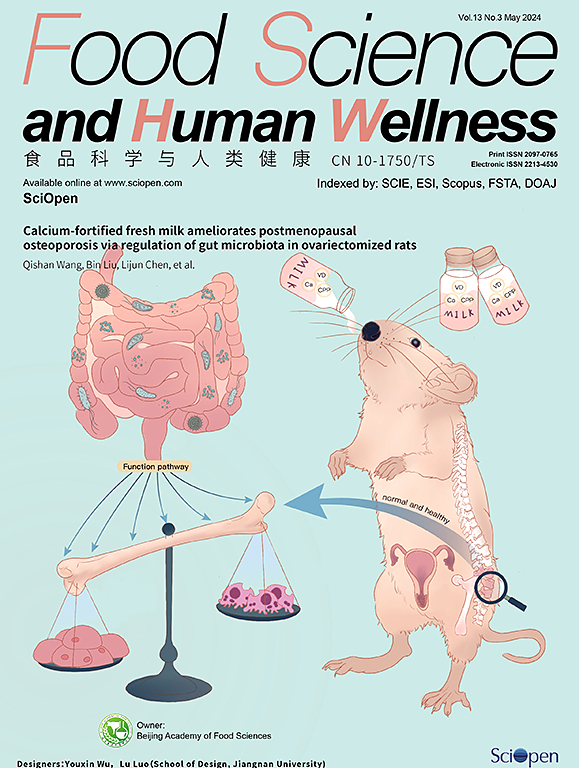γ-Aminobutyric acid alleviates litchi thaumatin-like protein-induced inflammation and reduces gut microbial translocation
IF 5.6
1区 农林科学
Q1 FOOD SCIENCE & TECHNOLOGY
引用次数: 0
Abstract
Previous research reported litchi thaumatin-like protein (LcTLP) could lead to inflammation, which is a factor causing the adverse reactions after excessive intake of litchi. As a main amino acid in litchi pulp, γ-aminobutyric acid (GABA) was found with anti-inflammatory effect. Therefore, this study aimed to investigate the effects of GABA on LcTLP-induced inflammation through RAW264.7 macrophages and C57BL mice models. In vitro study showed GABA could effectively regulate the level of inflammatory cytokines (interleukin (IL)-1β, IL-6, IL-10, and prostaglandin E2) and Ca2+ in cells, and inhibit the phosphorylation of p65, IκB, p38, c-Jun N-terminal kinase (JNK) and extracellular signal-regulated kinase (ERK). These results indicate GABA alleviated inflammation through nuclear factor-κB and mitogen-activated protein kinase pathways signaling pathways. In vivo experiment was performed to verify the anti-inflammatory effect of GABA, and the results demonstrated that GABA reduced the inflammation and oxidative stress in the liver of LcTLP-treated mice, as it down-regulated the pro-inflammatory cytokines, malondialdehyde, aspartate transferase, and alanine transaminase. The relative expression of phosphorylated p38, JNK and ERK in mice liver with GABA treatment were reduced to 65 %, 39 % and 80 % of the control group, respectively. Furthermore, GABA treatment enriched probiotic bacteria and decreased pathogenic bacteria in mice gut, which reveals GABA could effectively reduce the translocation of gut microbiota.
γ-氨基丁酸可减轻荔枝黄素样蛋白诱导的炎症反应并减少肠道微生物转移
先前的研究报告指出,荔枝褐斑样蛋白(LcTLP)可导致炎症,而炎症是导致过量摄入荔枝后出现不良反应的一个因素。γ-氨基丁酸(GABA)是荔枝果肉中的一种主要氨基酸,具有抗炎作用。因此,本研究旨在通过RAW264.7巨噬细胞和C57BL小鼠模型研究GABA对荔枝核诱导炎症的影响。体外研究表明,GABA 能有效调节细胞内炎症细胞因子(白细胞介素(IL)-1β、IL-6、IL-10 和前列腺素 E2)和 Ca2+ 的水平,并抑制 p65、IκB、p38、c-Jun N 端激酶(JNK)和细胞外信号调节激酶(ERK)的磷酸化。这些结果表明,GABA 可通过核因子-κB 和丝裂原活化蛋白激酶信号通路缓解炎症。为了验证GABA的抗炎作用,我们进行了体内实验,结果表明GABA能降低促炎细胞因子、丙二醛、天门冬氨酸转移酶和丙氨酸转氨酶,从而减轻LcTLP处理小鼠肝脏的炎症和氧化应激反应。经 GABA 处理的小鼠肝脏中磷酸化 p38、JNK 和 ERK 的相对表达量分别降至对照组的 65%、39% 和 80%。此外,GABA 还能丰富小鼠肠道中的益生菌,减少致病菌,这表明 GABA 能有效减少肠道微生物群的迁移。
本文章由计算机程序翻译,如有差异,请以英文原文为准。
求助全文
约1分钟内获得全文
求助全文
来源期刊

Food Science and Human Wellness
Agricultural and Biological Sciences-Food Science
CiteScore
8.30
自引率
5.70%
发文量
80
审稿时长
28 days
期刊介绍:
Food Science and Human Wellness is an international peer-reviewed journal that provides a forum for the dissemination of the latest scientific results in food science, nutriology, immunology and cross-field research. Articles must present information that is novel, has high impact and interest, and is of high scientific quality. By their effort, it has been developed to promote the public awareness on diet, advocate healthy diet, reduce the harm caused by unreasonable dietary habit, and directs healthy food development for food industrial producers.
 求助内容:
求助内容: 应助结果提醒方式:
应助结果提醒方式:


